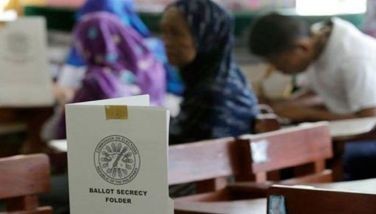900 Pinoys in Middle East jails to get royal clemency on Eid al-Fitr
November 3, 2002 | 12:00am
Nearly 900 Filipinos currently detained in various prisons and detention centers in the Middle East were included in the list of those who will be given the traditional royal clemency this year.
There are currently 896 Filipino prisoners in the eight Muslim countries, most of whom are detained in Riyadh and Jeddah in Saudi Arabia.
A report from the Department of Foreign Affairs (DFA) stated that Philippine embassies in Saudi Arabia, Bahrain, Jordan, Kuwait, Libya, Oman, Qatar, and the United Arab Emirates will submit the names of all Filipinos serving their sentences to the rulers of eight Muslim states.
The DFA expects the names of those who will be granted amnesty to be released after the month-long observation of Ramadan that ends on Dec. 5.
Traditionally, Muslim leaders give clemency to prisoners convicted of various crimes including those who have almost completed their prison terms, but is rarely given to those meted capital punishment.
Under the rules, a Muslim country can also grant amnesty to prisoners during the celebration of the birthday of the Prophet Mohammad.
In June last year, 89 overseas Filipino workers (OFWs), 49 of whom are women, were released on orders of UAE President Sheikh Zayed bin Sultan Al Nahyan. They were among the 6,000 prisoners freed in the largest amnesty ever granted by the UAE President.
Meanwhile, in Italy, some 40,000 undocumented Filipino workers, mostly domestic helpers, were given until Nov. 10 to apply for regularization to legalize their stay in the country.
The Philippine embassy in Rome said that under the new Italian Immigration Law that was passed in July 2002, foreigners working as domestic helpers or caregivers, who have been working for at least three months beginning June 2002, are eligible to apply for regularization.
Under the new law, employers are also required to file the application for amnesty, pay the equivalent three months social security contribution in favor of the worker, and provide suitable housing.
Contrary to earlier reports, there is no official indication that there will be mass deportation of illegal aliens in Italy after the expiration of the amnesty period.
This was what Philippine Ambassador to Rome Philippe Lhuillier said in a report back to the home office.
He also clarified that the earlier report that 130,000 Filipino illegals might be deported from Italy were highly inaccurate since the number was even higher than the estimated total number of Filipinos living in Italy.
He noted that in the previous years, the Italian government has not implemented mass expulsion of undocumented workers after gaining amnesty. But in case the Italian government decides to deport those who will avail of the amnesty, the Embassy said they have full confidence that the deportation will be done humanely and orderly since Italy is a strong advocate of human rights.
There are currently 896 Filipino prisoners in the eight Muslim countries, most of whom are detained in Riyadh and Jeddah in Saudi Arabia.
A report from the Department of Foreign Affairs (DFA) stated that Philippine embassies in Saudi Arabia, Bahrain, Jordan, Kuwait, Libya, Oman, Qatar, and the United Arab Emirates will submit the names of all Filipinos serving their sentences to the rulers of eight Muslim states.
The DFA expects the names of those who will be granted amnesty to be released after the month-long observation of Ramadan that ends on Dec. 5.
Traditionally, Muslim leaders give clemency to prisoners convicted of various crimes including those who have almost completed their prison terms, but is rarely given to those meted capital punishment.
Under the rules, a Muslim country can also grant amnesty to prisoners during the celebration of the birthday of the Prophet Mohammad.
In June last year, 89 overseas Filipino workers (OFWs), 49 of whom are women, were released on orders of UAE President Sheikh Zayed bin Sultan Al Nahyan. They were among the 6,000 prisoners freed in the largest amnesty ever granted by the UAE President.
Meanwhile, in Italy, some 40,000 undocumented Filipino workers, mostly domestic helpers, were given until Nov. 10 to apply for regularization to legalize their stay in the country.
The Philippine embassy in Rome said that under the new Italian Immigration Law that was passed in July 2002, foreigners working as domestic helpers or caregivers, who have been working for at least three months beginning June 2002, are eligible to apply for regularization.
Under the new law, employers are also required to file the application for amnesty, pay the equivalent three months social security contribution in favor of the worker, and provide suitable housing.
Contrary to earlier reports, there is no official indication that there will be mass deportation of illegal aliens in Italy after the expiration of the amnesty period.
This was what Philippine Ambassador to Rome Philippe Lhuillier said in a report back to the home office.
He also clarified that the earlier report that 130,000 Filipino illegals might be deported from Italy were highly inaccurate since the number was even higher than the estimated total number of Filipinos living in Italy.
He noted that in the previous years, the Italian government has not implemented mass expulsion of undocumented workers after gaining amnesty. But in case the Italian government decides to deport those who will avail of the amnesty, the Embassy said they have full confidence that the deportation will be done humanely and orderly since Italy is a strong advocate of human rights.
BrandSpace Articles
<
>
- Latest
- Trending
Trending
Latest
Trending
Latest
Recommended

































